WHAT IS BREXIT?
Brexit is the name given to the United Kingdom's departure from the European Unionand it’s a combination of the words “Britain” and “exit”. The process began with a referendum held on June 23, 2016, where a majority of UK citizens voted to exit the EU. Following negotiations and a transition period, Brexit officially took place at 23:00 GMT on January 31, 2020 and it marked a significant change in the UK's relationship with the EU, impacting areas such as trade, immigration policies, and economic cooperation.
Brexit è il nome dato all'uscita del Regno Unito dall'Unione Europea ed è una combinazione delle parole "Gran Bretagna" e "uscita". Il processo è iniziato con un referendum tenutosi il 23 giugno 2016, in cui la maggioranza dei cittadini britannici ha votato a favore dell’uscita dall’UE. Dopo i negoziati e un periodo di transizione, la Brexit ha avuto luogo ufficialmente alle 23:00 GMT del 31 gennaio 2020 e ha segnato un cambiamento significativo nelle relazioni del Regno Unito con l'UE, incidendo su aree come il commercio, le politiche di immigrazione e la cooperazione economica.
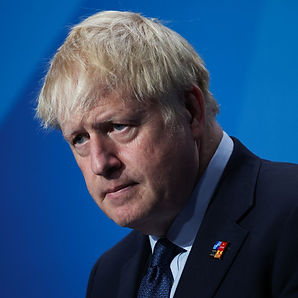
WHAT HAPPENED?
After Theresa may resigned Boris Johnson took up the role of prime minister and started from the beginning with a decisive outlook on the matter. “let’s get Brexit done” was his motto. Going along with his wishes The departure on January 31, 2020, marked the formal end, commencing a transition period until December 31, 2020. During this phase, the UK adhered to EU regulations as discussions unfolded regarding their future relationship.
The EU-UK Trade and Cooperation Agreement, effective from January 1 2021, averted a no-deal scenario by governing trade, security, and broader aspects of their post-Brexit collaboration.
On June 23 2016, David Cameron, prime minister of the UK at the time, held a crucial referendum in which every citizen voted whether to exit or not the European Union, where a slim majority, 51.9%, voted in favor of departure.
Subsequently, on March 29 2017, the UK, now under the prime minister Theresa may, invoked Article 50, initiating a two-year negotiation period to delineate the terms of its departure.
After extensive negotiations, a Withdrawal Agreement was reached addressing critical aspects such as the rights of EU and UK citizens, the financial settlement, and the intricacies of the Irish border.
Dopo le dimissioni di Theresa May, Boris Johnson ha assunto la carica di primo ministro e ha iniziato fin dall'inizio con una visione decisa della questione. “Portiamo a termine la Brexit” era il suo motto. Assecondando i suoi desideri La partenza del 31 gennaio 2020 ha segnato la fine formale, dando inizio a un periodo di transizione fino al 31 dicembre 2020. Durante questa fase, il Regno Unito ha aderito alle normative dell'UE mentre si svolgevano le discussioni sulle loro future relazioni. L’accordo commerciale e di cooperazione UE-Regno Unito, in vigore dal 1° gennaio 2021, ha evitato uno scenario senza accordo disciplinando il commercio, la sicurezza e gli aspetti più ampi della loro collaborazione post-Brexit.
Il 23 giugno 2016, David Cameron, all’epoca primo ministro del Regno Unito, tenne un referendum cruciale in cui ogni cittadino votò se uscire o meno dall’Unione Europea, dove una risicata maggioranza, il 51,9%, votò a favore dell’uscita. Successivamente, il 29 marzo 2017, il Regno Unito, ora sotto la guida del primo ministro Theresa May, ha invocato l’articolo 50, avviando un periodo di negoziazione di due anni per delineare i termini della sua uscita. Dopo lunghi negoziati, è stato raggiunto un accordo di recesso che affronta aspetti critici come i diritti dei cittadini dell’UE e del Regno Unito, la soluzione finanziaria e le complessità del confine irlandese.
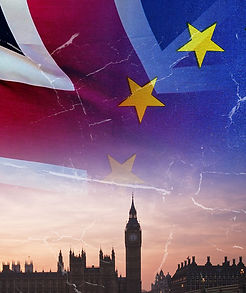
WHY IT HAPPENED?
The main reasons the UK decided to exit the EU where:
-
worries about too many people coming into the country
-
losing control over their own decisions
-
more freedom to make trade deals on their own.
This decision had some good and bad points, some thought it would give the UK more independence and control over its own affairs, while others worried about possible problems with trade and the rights of UK citizens living in other EU countries.
Le ragioni principali per cui il Regno Unito ha deciso di uscire dall’UE sono: teme che troppe persone entrino nel paese perdere il controllo sulle proprie decisioni maggiore libertà di concludere accordi commerciali per conto proprio. Questa decisione aveva alcuni aspetti positivi e negativi: alcuni pensavano che avrebbe dato al Regno Unito maggiore indipendenza e controllo sui propri affari, mentre altri erano preoccupati per possibili problemi con il commercio e i diritti dei cittadini britannici che vivono in altri paesi dell’UE.
WHAT WERE THE EFFECTS?
Brexit has been a strange situation in the recent years with it marking as a major change in how stable Europe and the EU is. For the European Union the effects have been minor but not nil. The major effect in the EU was that it lost its second largest economy, this is not to be overlooked as the economies of Europe are some of the largest in the world.
As for the UK the effects have been far from few. The most notable ones are that the uk has lost a a significant amount of political power and it’s future relationships with the European Union are uncertain. In regards to the economy it has been at a constant decrease averaging 2-3% of the GDP. This has also had a negative impact on the population as they are facing new troubles with recruitment of workers and costs at home and in the business.
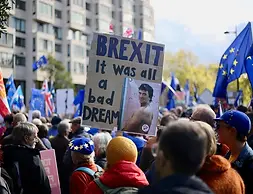
La Brexit è stata una situazione strana negli ultimi anni e ha segnato un cambiamento importante nella stabilità dell’Europa e dell’UE. Per l’Unione Europea gli effetti sono stati minori ma non nulli. L’effetto principale nell’UE è stato la perdita della sua seconda economia più grande, un fatto da non trascurare poiché le economie europee sono tra le più grandi al mondo. Per quanto riguarda il Regno Unito, gli effetti sono stati tutt’altro che scarsi. I più notevoli sono che il Regno Unito ha perso una notevole quantità di potere politico e le sue future relazioni con l’Unione Europea sono incerte. Per quanto riguarda l'economia, si è registrato un calo costante, in media del 2-3% del PIL. Ciò ha avuto un impatto negativo anche sulla popolazione che si trova ad affrontare nuovi problemi con il reclutamento di lavoratori e i costi a casa e in azienda.
PEOPLE'S OPINION
Two-thirds think Brexit has damaged the economy, while even among Leave voters only one in five think the impact has been positive (UK in a Changing Europe 2023). The vast majority of economists would agree.
In EU countries:
Concern for Unity -> Some express concern about the potential impact on the unity of the European Union and the future of the integration project.
Economic Implications -> European nations, particularly those with close economic ties to the UK, may be concerned about the economic consequences of changes in trade relations.
Mixed Sentiments -> While some see Brexit as an opportunity for the EU to redefine itself and strengthen internal cohesion, others view it as a setback.
In the UK:
Divided Opinions -> Opinions within the UK itself are divided, with some regions expressing regret over leaving the EU, while others remain steadfast in supporting the decision.
Impact on EU Citizens -> EU citizens living in the UK and vice versa are particularly attentive to the impact of Brexit on their residency rights and future opportunities.
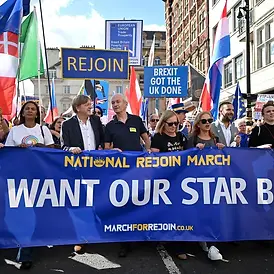
Due terzi ritengono che la Brexit abbia danneggiato l’economia, mentre anche tra gli elettori del Leave solo uno su cinque ritiene che l’impatto sia stato positivo (UK in a Changing Europe 2023). La stragrande maggioranza degli economisti sarebbe d’accordo. Nei paesi dell'UE: Preoccupazione per l'unità -> Alcuni esprimono preoccupazione per il potenziale impatto sull'unità dell'Unione europea e sul futuro del progetto di integrazione. Implicazioni economiche -> Le nazioni europee, in particolare quelle con stretti legami economici con il Regno Unito, potrebbero essere preoccupate per le conseguenze economiche dei cambiamenti nelle relazioni commerciali. Sentimenti contrastanti -> Mentre alcuni vedono la Brexit come un’opportunità per l’UE di ridefinire se stessa e rafforzare la coesione interna, altri la vedono come una battuta d’arresto. Nel Regno Unito: Opinioni divise -> Le opinioni all'interno dello stesso Regno Unito sono divise, con alcune regioni che esprimono rammarico per l'uscita dall'UE, mentre altre rimangono ferme nel sostenere la decisione. Impatto sui cittadini dell'UE -> I cittadini dell'UE che vivono nel Regno Unito e viceversa sono particolarmente attenti all'impatto della Brexit sui loro diritti di residenza e sulle opportunità future.
NOW
How is the monarchy in the UK structured after Brexit?
Brexit itself did not significantly alter the structure of the monarchy in the UK, in fact the monarchy's role remains largely ceremonial and symbolic.
When Brexit occurred Queen Elizabeth II was the reigning monarch but she passed away a few years later. Currently the reigning monarch is Charles III serving as the head of state and the constitutional framework, which includes a constitutional monarchy and parliamentary democracy, remains unchanged.
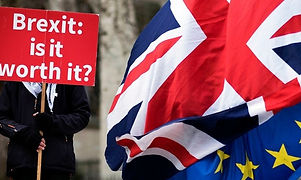
Post-Brexit, the UK continues to have a constitutional monarchy where the monarch's powers are limited by laws and regulations and the day-to-day governance is carried out by elected representatives. The Prime Minister, as the head of government, is responsible for making policy decisions, while the Parliament, consisting of the House of Commons and the House of Lords, plays a crucial role in the legislative process.
Brexit mainly impacted political and economic aspects, with changes in trade relations and international partnerships, but the monarchy's structure and function remain consistent with its historical role within the constitutional framework of the United Kingdom.
Come è strutturata la monarchia nel Regno Unito dopo la Brexit? La Brexit in sé non ha alterato in modo significativo la struttura della monarchia nel Regno Unito, anzi il ruolo della monarchia rimane in gran parte cerimoniale e simbolico. Quando si verificò la Brexit, la regina Elisabetta II era il monarca regnante, ma morì pochi anni dopo. Attualmente il monarca regnante è Carlo III che funge da capo di stato e il quadro costituzionale, che comprende una monarchia costituzionale e una democrazia parlamentare, rimane invariato.
Dopo la Brexit, il Regno Unito continua ad avere una monarchia costituzionale in cui i poteri del monarca sono limitati da leggi e regolamenti e la governance quotidiana è affidata a rappresentanti eletti. Il Primo Ministro, in quanto capo del governo, è responsabile delle decisioni politiche, mentre il Parlamento, composto dalla Camera dei Comuni e dalla Camera dei Lord, svolge un ruolo cruciale nel processo legislativo. La Brexit ha avuto un impatto principalmente sugli aspetti politici ed economici, con cambiamenti nelle relazioni commerciali e nei partenariati internazionali, ma la struttura e la funzione della monarchia rimangono coerenti con il suo ruolo storico all’interno del quadro costituzionale del Regno Unito.